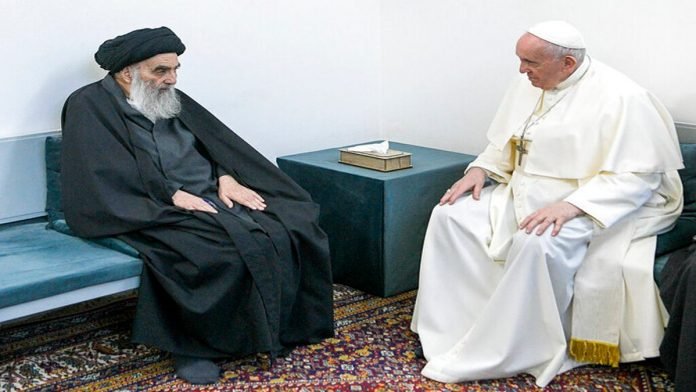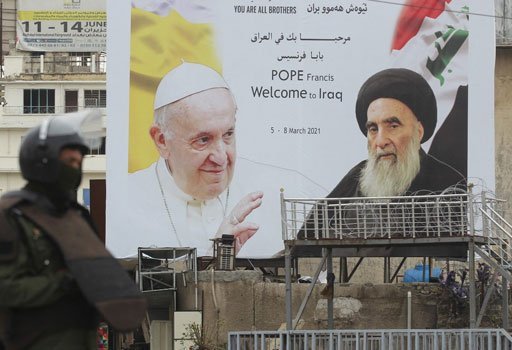
Pope Francis met with a top Shia cleric in Iraq on Saturday as part of his historic three-day visit to the country amid the COVID-19 pandemic.
The meeting with Grand Ayatollah Ali al-Sistani, one of the most influential clerics in Shia Islam, took place in the holy city of Najaf and was meant to deliver a message of cooperation and friendship between religious communities.
Pope Francis sought to reinforce ties across religions during the second day of his trip to Iraq, visiting a top Shiite Muslim cleric on Saturday and leading a meeting with representatives of different faiths at the ancient site of Ur in the south of the country.
According to scripture, Ur is the birthplace of Abraham, considered the founder of monotheism and revered by Christians, Muslims and Jews. In a ceremony that gathered a few dozen people next to an excavated part of the ancient city site Iraqis call the House of Abraham, Francis recalled a passage in Genesis where God calls on Abraham to look at the stars and imagine how numerous his descendants will be.
“In those stars, he saw the promise of his descendants, he saw us,” said Francis. The pope invited the assembled Christians, Muslims and representatives of Iraq’s other minority faiths — including Yazidis and Sabean Mandeans — to see in the stars a message of unity.
“They illumine the darkest nights because they shine together,” said Francis.
Following the meeting, al-Sistani said in a statement: “Religious and spiritual leadership must play a big role to put a stop to tragedy and urge sides, especially great powers, to make wisdom and sense prevail and erase the language of war.”
Al-Sistani affirmed that Iraq’s Christians should live in peace and enjoy the same rights as other Iraqis. Pope Francis said the ayatollah’s message of peace affirmed “the sacredness of human life and the importance of the unity of the Iraqi people.”
He added that Christians, like all other Iraqis, should be able to live in peace and coexistence.
For his part, Pope Francis thanked al-Sistani for having “raised his voice in defence of the weakest”, according to the Vatican.
The papal visit is in support of Iraq’s Christian minority that has faced years of war and persecution.
The meeting took place at al-Sistani’s home in Najaf and was months in the making with details negotiated between the ayatollah’s office and the Vatican.
The 84-year-old pontiff’s convoy was led by a bullet-proof vehicle and when he arrived at the home on Saturday, a few doves were released in a sign of peace.

Al-Sistani’s role in Iraq
On the few occasions where he has made his opinion known, the notoriously reclusive al-Sistani has shifted the course of Iraq’s modern history.
He preached calm and restraint after the 2003 US-led invasion as the Shiite majority came under attack by al-Qaida and other Sunni extremists. The country was nevertheless plunged into years of sectarian violence.
His 2014 fatwa, or religious edict, calling on able-bodied men to join the security forces in fighting the Islamic State group swelled the ranks of Shiite militias, many closely tied to Iran. In 2019, as anti-government demonstrations gripped the country, his sermon lead to the resignation of then-prime minister Adil Abdul-Mahdi.
Iraqis have welcomed the visit as the country struggles to recover from decades of war and unrest. Iraq declared victory over the Islamic State group in 2017 but still sees sporadic attacks including recent rocket attacks by Iran-backed militias against US military and diplomatic facilities.
The violence is linked to the standoff between the US and Iran following Washington’s withdrawal from the 2015 nuclear accord and its imposition of crippling sanctions on Iran.
Support Independent Journalism Today
Our unwavering dedication is to provide you with unbiased news, diverse perspectives, and insightful opinions. We're on a mission to ensure that those in positions of power are held accountable for their actions, but we can't do it alone. Labour Heartlands is primarily funded by me, Paul Knaggs, and by the generous contributions of readers like you. Your donations keep us going and help us uphold the principles of independent journalism. Join us in our quest for truth, transparency, and accountability – donate today and be a part of our mission!
Like everyone else, we're facing challenges, and we need your help to stay online and continue providing crucial journalism. Every contribution, no matter how small, goes a long way in helping us thrive. By becoming one of our donors, you become a vital part of our mission to uncover the truth and uphold the values of democracy.
While we maintain our independence from political affiliations, we stand united against corruption, injustice, and the erosion of free speech, truth, and democracy. We believe in the power of accurate information in a democracy, and we consider facts non-negotiable.
Your support, no matter the amount, can make a significant impact. Together, we can make a difference and continue our journey toward a more informed and just society.
Thank you for supporting Labour Heartlands











